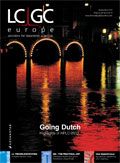Event News: 40th International Symposium on High Performance Liquid Chromatography and Related Techniques (HPLC2013—Hobart)
The 40th International Symposium on High Performance Liquid Chromatography and Related Techniques (HPLC2013-Hobart) will take place at the Hotel Grand Chancellor, Hobart, Tasmania, Australia, from 18–21 November 2013.
The 40th International Symposium on High Performance Liquid Chromatography and Related Techniques (HPLC2013-Hobart) will take place at the Hotel Grand Chancellor, Hobart, Tasmania, Australia, from 18–21 November 2013. Co-chaired by Paul Haddad and Emily Hilder and supported by the Analytical and Environmental Chemistry Division of the Royal Australian Chemical Institute (RACI), the HPLC conference series is a leading meeting dedicated to liquid phase separation science. The conference originated in 1973 and is an annual meeting, alternating between the United States and Europe. Since 2008 additional meetings are also held in Asia and other continents. This will be the first time that the HPLC meeting is held in the Australasian region. Hobart offers a delightful location for the meeting, and was recently recognized as one of the world's top 10 cities to visit by Lonely Planet and also rated as the second friendliest city in the world.
The HPLC symposia represent an invaluable resource for analytical chemists, biochemists, molecular biologists, and those in the separation sciences seeking practical solutions. The meeting will feature an extensive technical programme of lecture and poster presentations which will focus on providing practical solutions to address the diverse challenges faced by today's scientists. These presentations will be supplemented by a series of educational programmes to provide insights into the latest areas of liquid-based separations and to address various practical problems.

Following on from the success of the previous meeting in Amsterdam in June 2013, HPLC2013-Hobart will feature a dedicated education programme including both short courses and tutorial lectures delivered by international experts within the field. Three short courses will precede the formal meeting programme including advanced HPLC method development (1.5 days), and the latest advances in liquid chromatography–mass spectrometry (LC–MS) (1 day) and polymer monoliths (0.5 day). There will also be nine tutorial lectures included within the lecture programme, including topics such as ultrahigh-pressure liquid chromatography (UHPLC), microfluidics, chiral separations, column efficiency, system performance, environmental analysis, and electroseparations. The short courses and tutorials will be of interest to scientists with limited experience as well as those who are experienced in the field but who are also interested in extending their knowledge to new topics.
The scientific programme will be comprised of plenary, keynote, tutorial, contributed lectures, and prominently featured poster presentations. Plenary and keynote lectures will be presented by leading academic and industrial scientist from around the world including Georges Guiochon (University of Tennessee, USA); Peter Schoenmakers (University of Amsterdam, the Netherlands); Gert Desmet (Vrije University Brussels, Belgium); Robert Kennedy (University of Michigan, USA); Michael Ramsey (University of North Carolina, USA); Takehiko Kitamori (University of Tokyo, Japan); Monika Dittman (Agilent Technologies, Germany); Hian Kee Lee (National University of Singapore, Singapore); Frantisek Svec (Lawrence Berkeley National Laboratory, USA); and Bill Hancock (Northeastern University, USA). A range of topics related to HPLC will be covered during the meeting including: Advances in column technology; separation selectivity; advanced detection techniques and detectors including LC–MS and capillary electrophoresis–mass spectrometry (CE–MS); micro- and nano-fluidics; new instrumentation; sample preparation; nanoscience in chromatography; chemometrics; method development and optimization; multidimensional separations; capillary techniques; and electro-separations.
In addition to the scientific content, HPLC2013-Hobart will include vendor exhibits and presentations where delegates can learn about the latest developments in instrumentation and columns for liquid phase separations.
E-mail: alexis@asnevents.net.au
Website: www.hplc2013-hobart.org
17–18 September 2013
3rd European GC×GC Symposium
Chateâu Valrose, Parc Valrose, University of Nice-Sophia Antipolis, Nice, France
Organizers: LECO and the University of Nice-Sophia Antipolis
Tel: +49 2166 687 305
E-mail: GCxGC@leco-europe.com
Website: http://www.events-gcxgc.eu
21–23 October 2013
1st Global IC User Meeting
Metrohm AG — International Headquarters, Herisau, Switzerland
Organizer: Metrohm Academy
Tel: +41 71 353 85 85
E-mail: info@metrohm.com
Website: www.metrohm.com
5–8 November 2013
6th International Symposium on Recent Advances In Food Analysis
Clarion Congress Hotel, Prague, Czech Republic
Co-chairs: Professor Jana Hajslova and Professor Michel Nielen
Tel: +420 605 423 873
E-mail: RAFA2013@vscht.cz
Website: www.rafa2013.eu
28–31 January 2014
HTC-13/HTSP-3
Old Saint John Conference Centre, Bruges, Belgium
Organizers: KVCV (BE)/RSC (UK)
Tel: +32 (0) 9 264 9606
E-mail: info@htc-conference.org
Website: www.htc-conference.org
6–9 July 2014
8th International Conference on Breath Research & Cancer Diagnosis
Torun, Poland
Organizers: Nicolaus Copernicius University, Polish Chemical Society, and the Committee of Analytical Chemistry PAS
Tel: +48 56 6114753
E-mail: conference@breath2014.pl
Website: www.breath2014.pl
Send any event news to Bethany Degg bdegg@advanstar.com

















Thermodynamic Insights into Organic Solvent Extraction for Chemical Analysis of Medical Devices
April 16th 2025A new study, published by a researcher from Chemical Characterization Solutions in Minnesota, explored a new approach for sample preparation for the chemical characterization of medical devices.
Sorbonne Researchers Develop Miniaturized GC Detector for VOC Analysis
April 16th 2025A team of scientists from the Paris university developed and optimized MAVERIC, a miniaturized and autonomous gas chromatography (GC) system coupled to a nano-gravimetric detector (NGD) based on a NEMS (nano-electromechanical-system) resonator.
Miniaturized GC–MS Method for BVOC Analysis of Spanish Trees
April 16th 2025University of Valladolid scientists used a miniaturized method for analyzing biogenic volatile organic compounds (BVOCs) emitted by tree species, using headspace solid-phase microextraction coupled with gas chromatography and quadrupole time-of-flight mass spectrometry (HS-SPME-GC–QTOF-MS) has been developed.
A Guide to (U)HPLC Column Selection for Protein Analysis
April 16th 2025Analytical scientists are faced with the task of finding the right column from an almost unmanageable range of products. This paper focuses on columns that enable protein analysis under native conditions through size exclusion, hydrophobic interaction, and ion exchange chromatography. It will highlight the different column characteristics—pore size, particle size, base matrices, column dimensions, ligands—and which questions will help decide which columns to use.
Thermodynamic Insights into Organic Solvent Extraction for Chemical Analysis of Medical Devices
April 16th 2025A new study, published by a researcher from Chemical Characterization Solutions in Minnesota, explored a new approach for sample preparation for the chemical characterization of medical devices.
Sorbonne Researchers Develop Miniaturized GC Detector for VOC Analysis
April 16th 2025A team of scientists from the Paris university developed and optimized MAVERIC, a miniaturized and autonomous gas chromatography (GC) system coupled to a nano-gravimetric detector (NGD) based on a NEMS (nano-electromechanical-system) resonator.
Miniaturized GC–MS Method for BVOC Analysis of Spanish Trees
April 16th 2025University of Valladolid scientists used a miniaturized method for analyzing biogenic volatile organic compounds (BVOCs) emitted by tree species, using headspace solid-phase microextraction coupled with gas chromatography and quadrupole time-of-flight mass spectrometry (HS-SPME-GC–QTOF-MS) has been developed.
A Guide to (U)HPLC Column Selection for Protein Analysis
April 16th 2025Analytical scientists are faced with the task of finding the right column from an almost unmanageable range of products. This paper focuses on columns that enable protein analysis under native conditions through size exclusion, hydrophobic interaction, and ion exchange chromatography. It will highlight the different column characteristics—pore size, particle size, base matrices, column dimensions, ligands—and which questions will help decide which columns to use.
